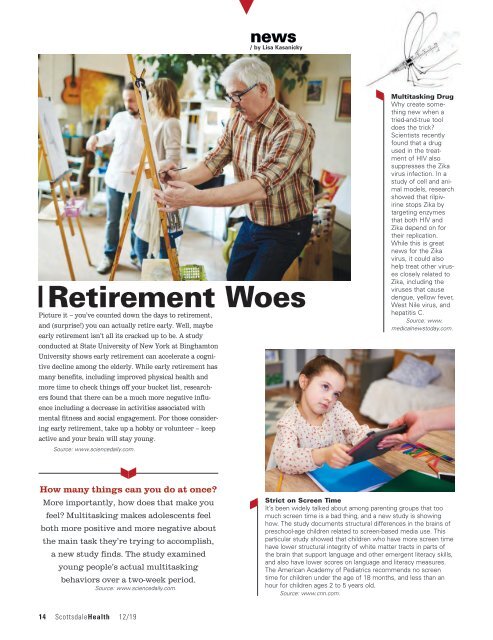Scottsdale Health December 2019
Create successful ePaper yourself
Turn your PDF publications into a flip-book with our unique Google optimized e-Paper software.
news<br />
/ by Lisa Kasanicky<br />
Retirement Woes<br />
Picture it – you’ve counted down the days to retirement,<br />
and (surprise!) you can actually retire early. Well, maybe<br />
early retirement isn’t all its cracked up to be. A study<br />
conducted at State University of New York at Binghamton<br />
University shows early retirement can accelerate a cognitive<br />
decline among the elderly. While early retirement has<br />
many benefits, including improved physical health and<br />
more time to check things off your bucket list, researchers<br />
found that there can be a much more negative influence<br />
including a decrease in activities associated with<br />
mental fitness and social engagement. For those considering<br />
early retirement, take up a hobby or volunteer – keep<br />
active and your brain will stay young.<br />
Source: www.sciencedaily.com.<br />
Multitasking Drug<br />
Why create something<br />
new when a<br />
tried-and-true tool<br />
does the trick?<br />
Scientists recently<br />
found that a drug<br />
used in the treatment<br />
of HIV also<br />
suppresses the Zika<br />
virus infection. In a<br />
study of cell and animal<br />
models, research<br />
showed that rilpivirine<br />
stops Zika by<br />
targeting enzymes<br />
that both HIV and<br />
Zika depend on for<br />
their replication.<br />
While this is great<br />
news for the Zika<br />
virus, it could also<br />
help treat other viruses<br />
closely related to<br />
Zika, including the<br />
viruses that cause<br />
dengue, yellow fever,<br />
West Nile virus, and<br />
hepatitis C.<br />
Source: www.<br />
medicalnewstoday.com.<br />
How many things can you do at once?<br />
More importantly, how does that make you<br />
feel? Multitasking makes adolescents feel<br />
both more positive and more negative about<br />
the main task they’re trying to accomplish,<br />
a new study finds. The study examined<br />
young people’s actual multitasking<br />
behaviors over a two-week period.<br />
Source: www.sciencedaily.com.<br />
Strict on Screen Time<br />
It’s been widely talked about among parenting groups that too<br />
much screen time is a bad thing, and a new study is showing<br />
how. The study documents structural differences in the brains of<br />
preschool-age children related to screen-based media use. This<br />
particular study showed that children who have more screen time<br />
have lower structural integrity of white matter tracts in parts of<br />
the brain that support language and other emergent literacy skills,<br />
and also have lower scores on language and literacy measures.<br />
The American Academy of Pediatrics recommends no screen<br />
time for children under the age of 18 months, and less than an<br />
hour for children ages 2 to 5 years old.<br />
Source: www.cnn.com.<br />
14 <strong>Scottsdale</strong><strong>Health</strong> 12/19

















